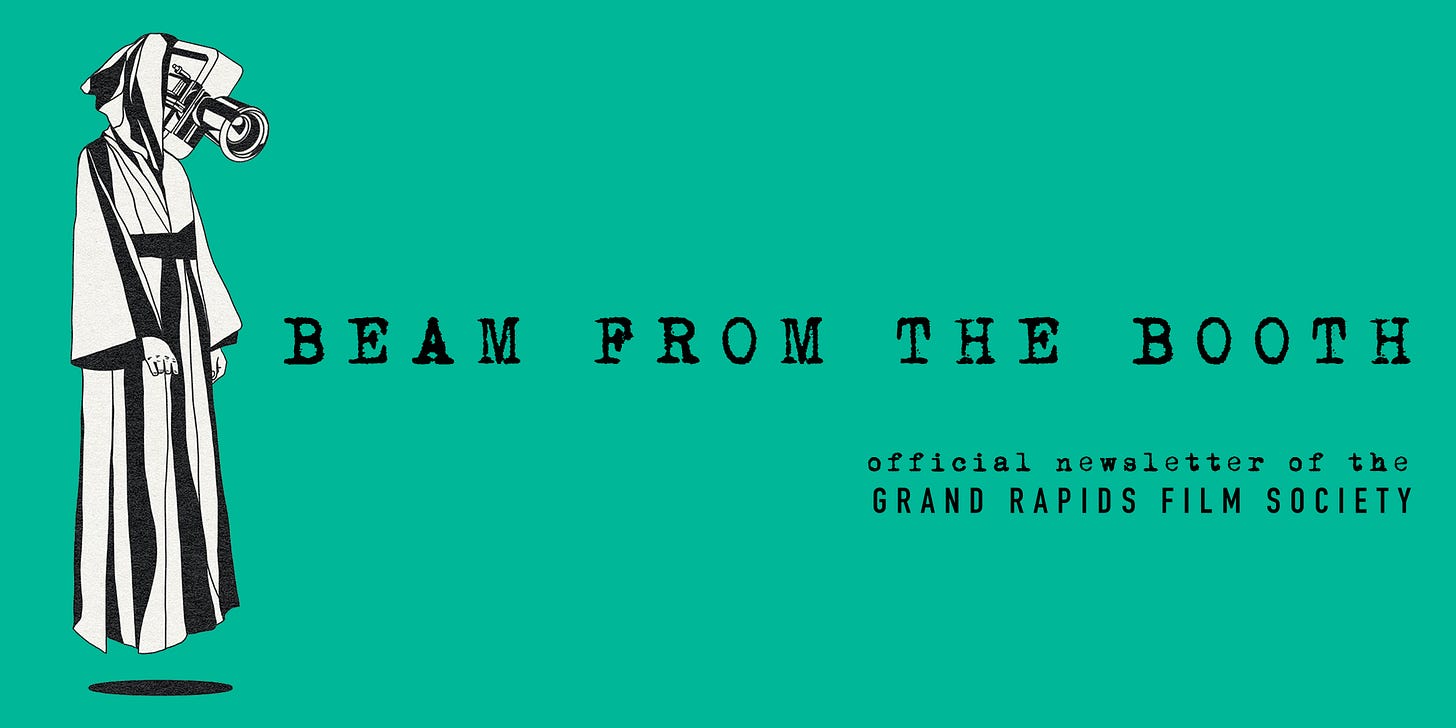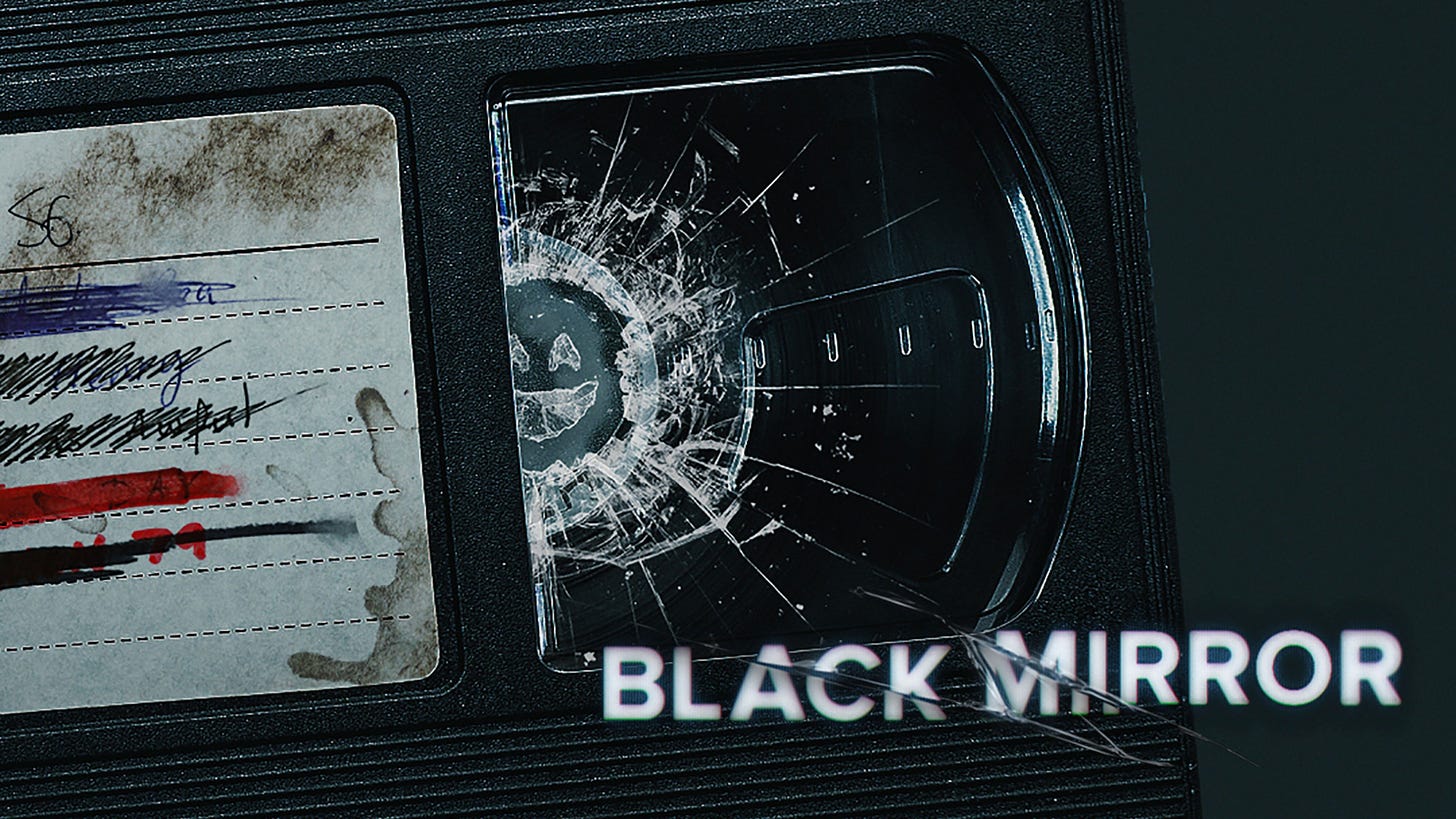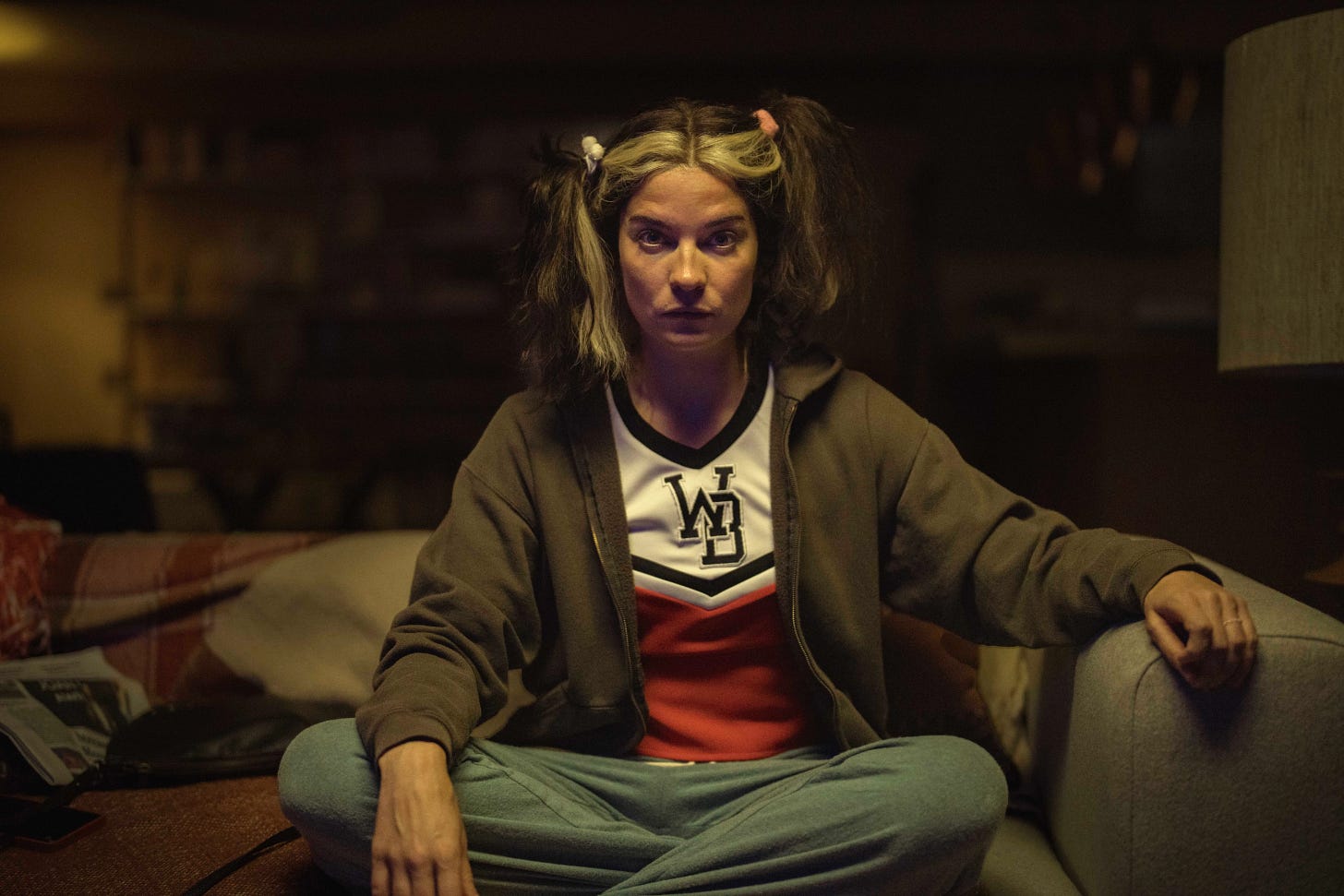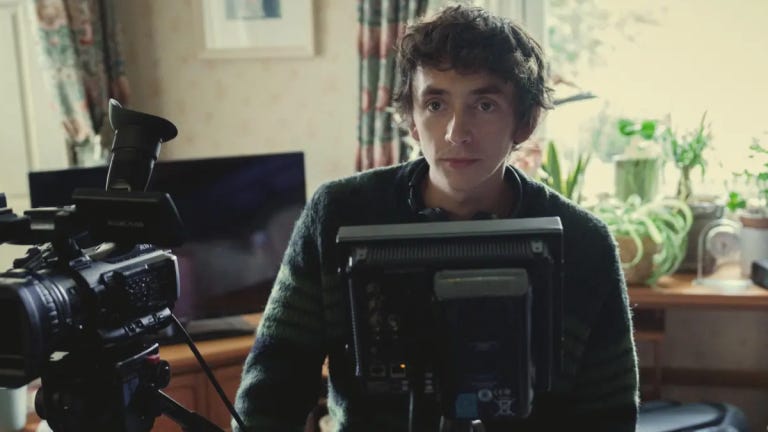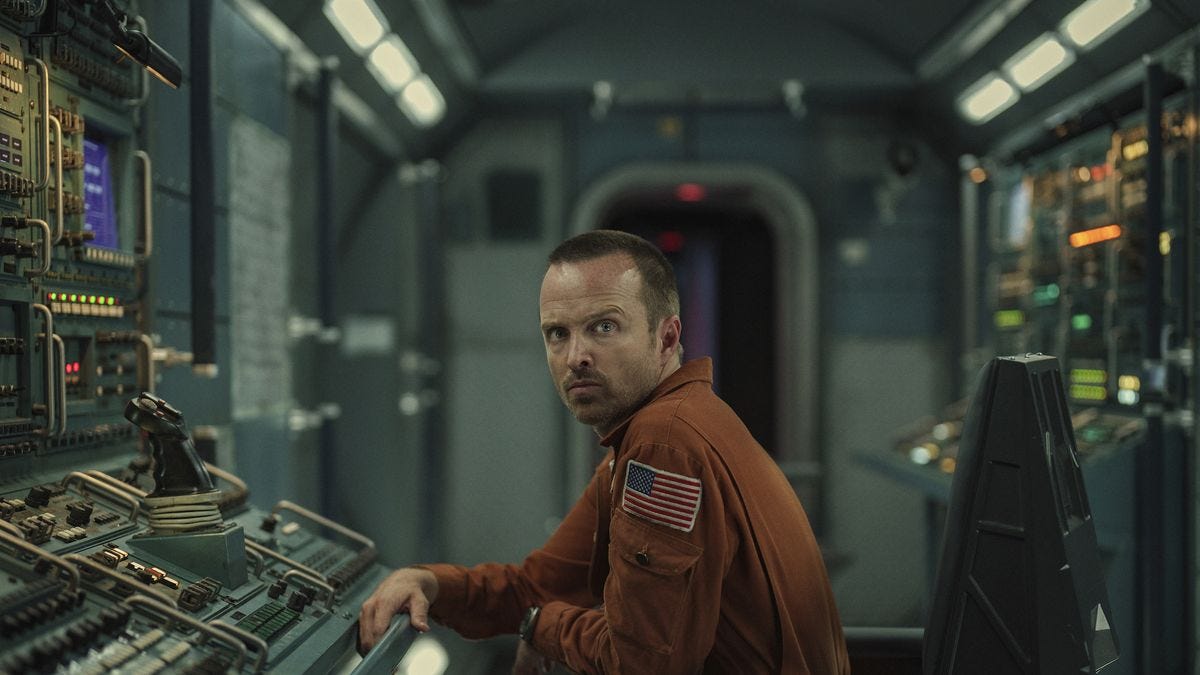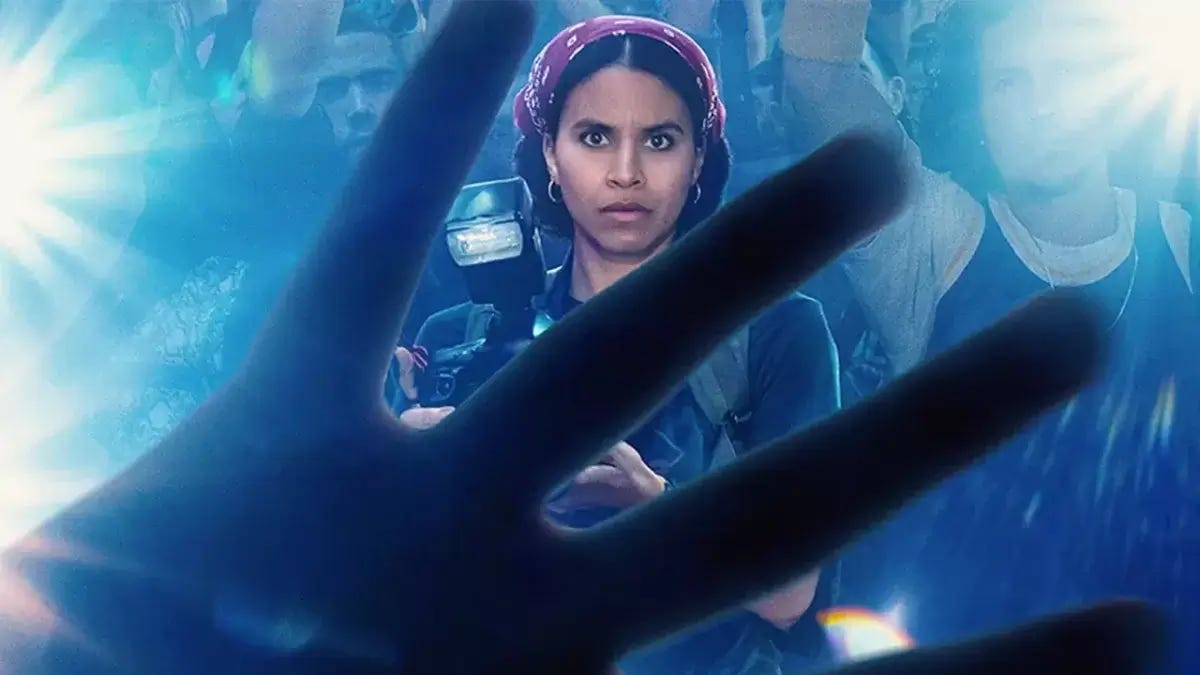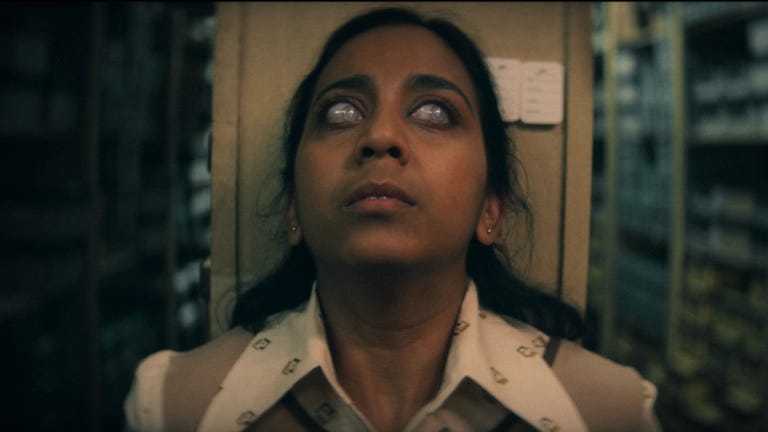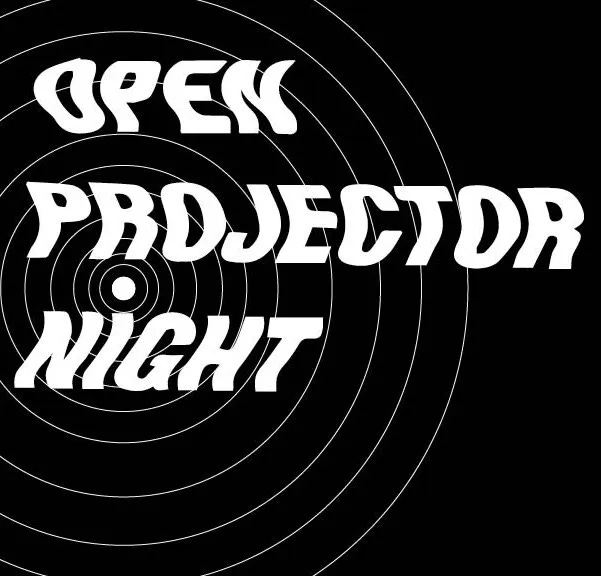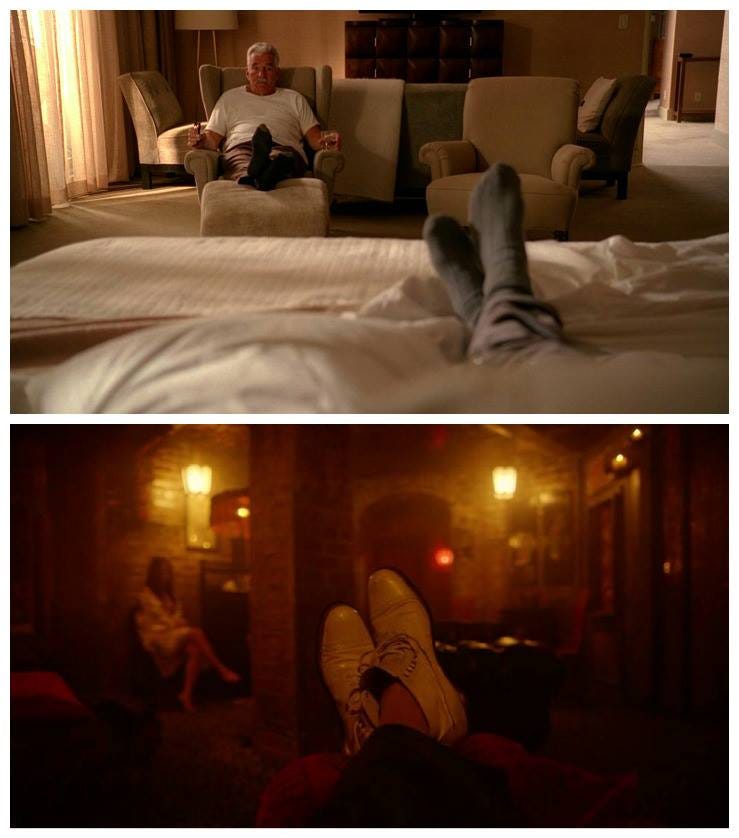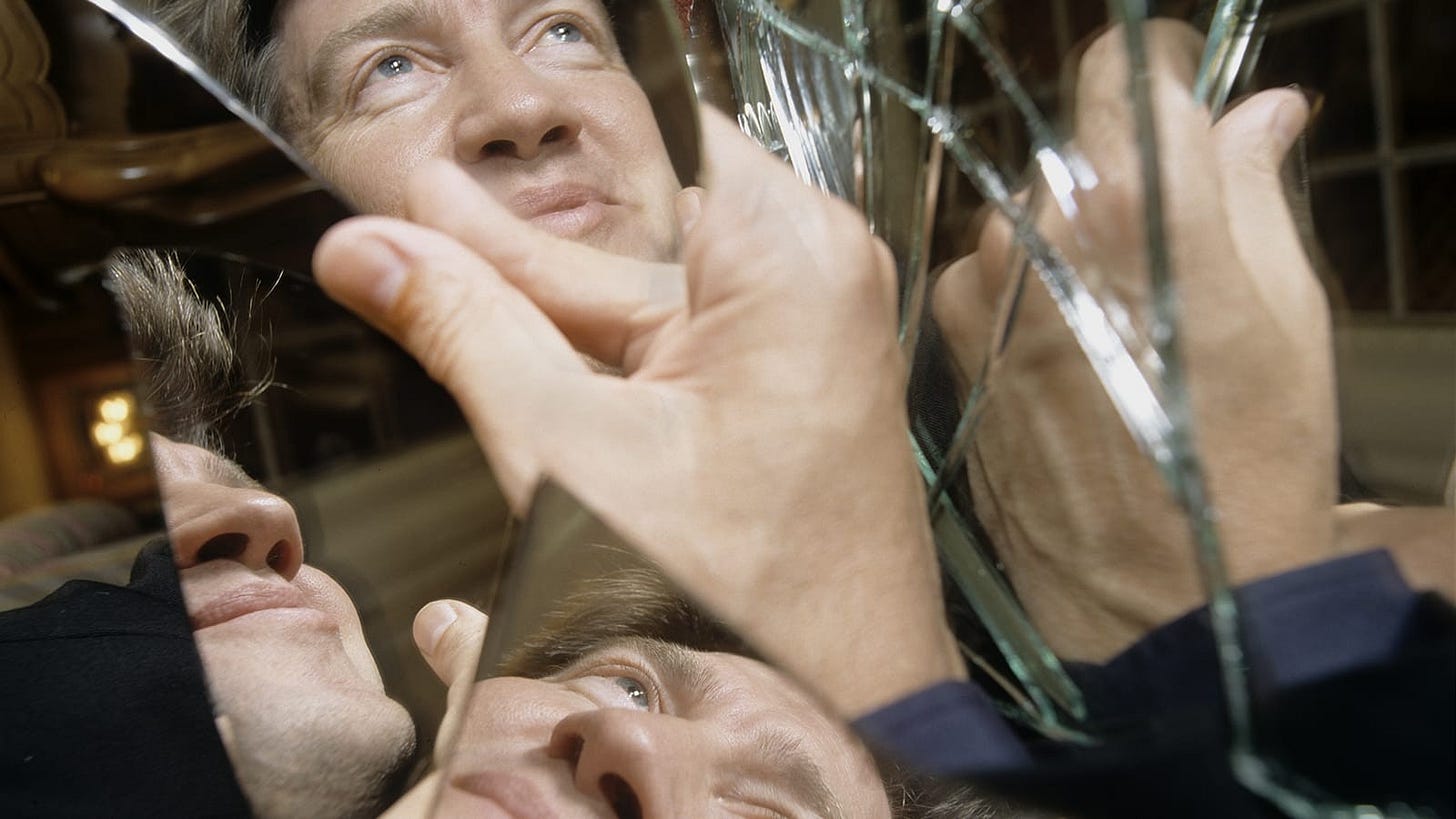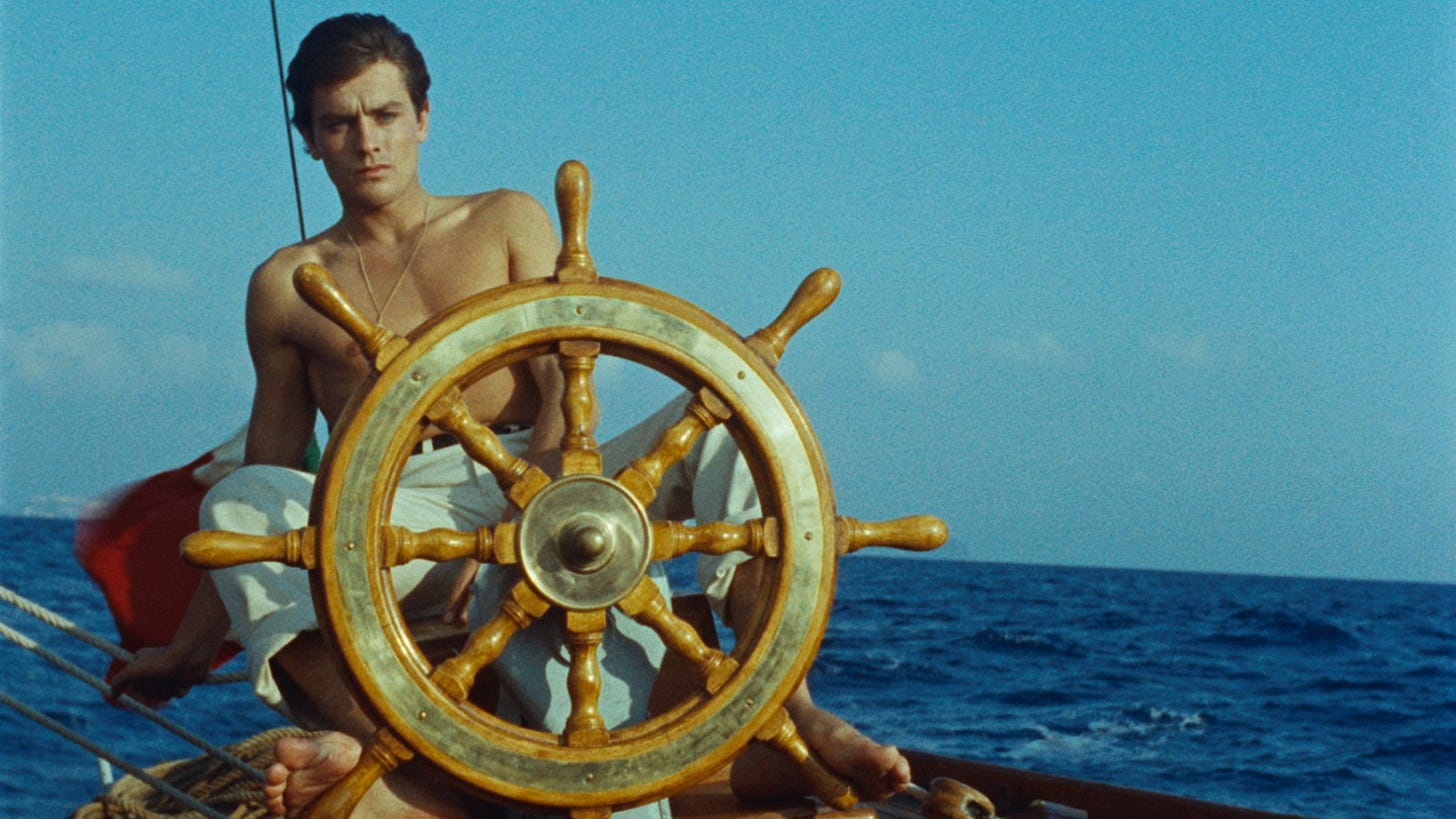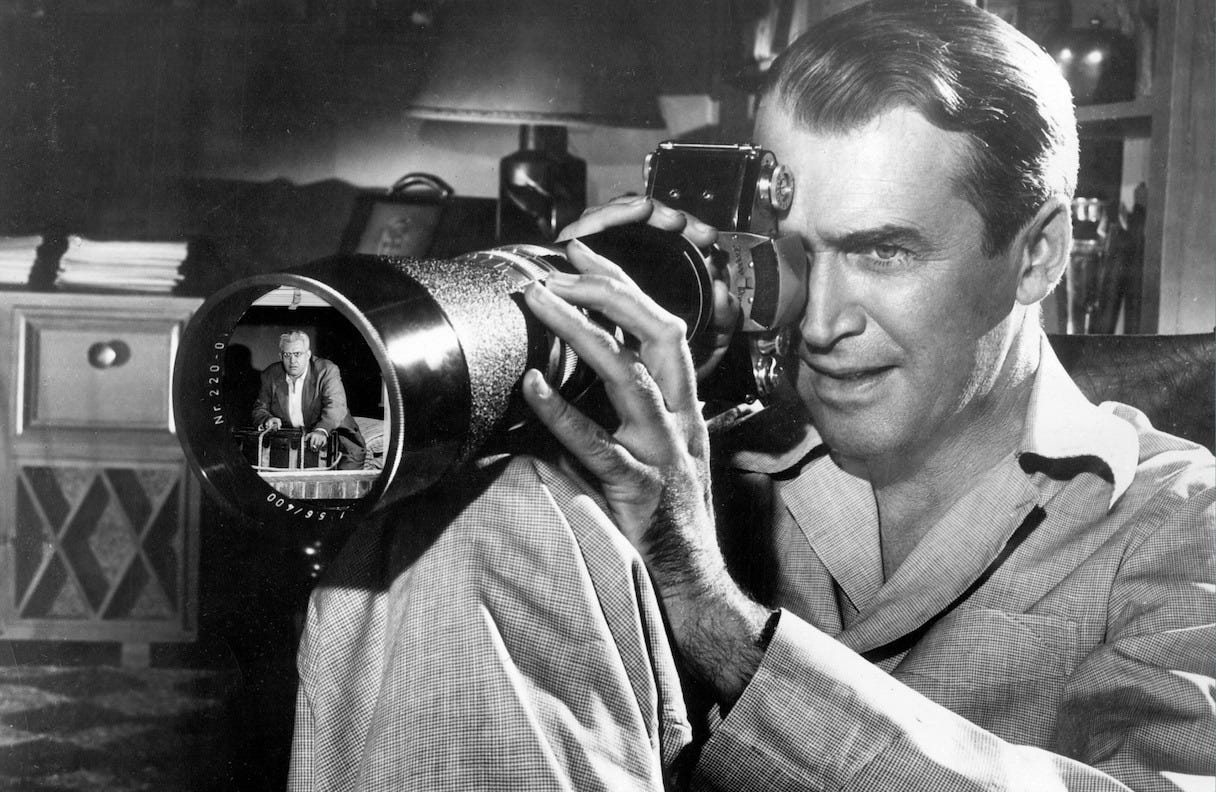[EDITED BY: GRIFFIN SHERIDAN]
Welcome to an all-new installment of BEAM FROM THE BOOTH, brought to you by GRAND RAPIDS FILM SOCIETY!
Summer is firmly upon us here in West MI, though certain environmental events have made it hard to enjoy the weather safely, which is — of course — upsetting. On the bright side, this is the perfect excuse to hunker down and get some summer movie viewing in! Be sure to let us know what you have been watching lately in the comments below and on our socials. I know there are folks who would love to chat over in our DISCORD server.
Speaking of what we have been watching, our own Breana Malloy just finished the latest season of Black Mirror and is here to tell you all about it...
BLACK MIRROR: SEASON 6 ANALYSIS
[BY: BREANA MALLOY]
Let’s talk about Black Mirror. Season 6 recently dropped on Netflix after a four-year long hiatus. The creator, Charlie Brooker, writes the episodes based on technology and its connections to humanity. However, for the last two episodes of this new season he strays away from his usual structure and brings our attention to the supernatural. That is a bold choice, as many viewers were disappointed with season 5 and didn’t have high hopes for season 6. I will walk through all five episodes of season 6, give you my honest opinions, and leave the rest up for you to discuss on the GRFS discord. Let's do it.
“Joan is Awful”
Starting off the season with an AI commentary was a great marketing decision on Netflix’s end. The episode follows Joan, played by Annie Murphy, throughout her day. When she gets home, she goes on a streaming service and finds her life has been broadcasted to the world — and she is displayed in a less-than-appealing manner. Salma Hayek plays Joan in the show. Michael Cera also makes a brief appearance. How would people not talk about it!?
The episode comments on AI and its impending possibilities to create and generate art that is personalized and the invasive nature of entertainment. More than that, it makes the viewer reflect on how much information companies have on a person and how susceptible people are to believing in whatever they want to sell us. In the episode, “Streamberry” — the show's version of Netflix — states: “We chose an average, unimportant person,” emphasizing how these big conglomerates see the general population. Anyone and everyone could be the next Joan. Is Netflix trying to be self-aware? Or just freak everyone out? Although this episode brings some compelling thoughts to the forefront, the ending feels a little lackluster; just another black hole of alternative universes.
“Loch Henry”
Another episode that focuses on the original Black Mirror premise, this one with a close eye on entertainment media and how we let it guide our lives and our morals. We are introduced to a young couple, Pia and Davis, visiting Davis’ hometown in Scotland. They are young and ambitious filmmakers coming to make a documentary about an egg theft. When they come to town and Pia learns about the town’s infamous serial killer, she convinces Davis to pivot narratives.
At the core of the story, it is about our fascination with true crime, what humans will do to ‘get views,; and what lengths they will go to. Ultimately, it doesn’t matter who gets hurt in the process. It’s ruthless behavior in the name of entertainment. At the end of it all, we see the shell of a person. We see what happens when you disregard human decency and go the way of views and dollar signs. Although we see this all unfold quickly (54 minutes to be precise), the process is much slower and silent, yet deadly. I wouldn’t say this is revolutionary, but I liked it — it is a solid story.
“Beyond the Sea”
This episode seems to have created the most divisive opinions. Some are saying it’s a great episode, others despise it. I fall in the middle. “Beyond the Sea” is set in an alternative 1960s reality in outer space. Two astronauts, played by Aaron Paul and Josh Hartnett, work in space while their robot counterparts live on Earth with their families. Through the use of advanced technology in this alternate historical reality, the astronauts can connect their consciousness to their robot counterparts and live in both places. One evening after a movie, Hartnett’s character's family is slaughtered by a group that finds robots to be unnatural, and his duplicate is destroyed. As he slowly descends into a worsened state up in space, Paul’s character offers him time in his duplicate. That is where things start to go awry.
Midway through watching this I wrote in my notes “Humanity can so quickly be lost when you have nothing left” — I find this to be one of the main themes of the episode. Although the story is technology-adjacent, this feels to be more about individuals and the ways in which they can so easily unravel or change. The technology, in this case, is just a vessel. The story was lacking for me at times; personally, I believe the acting is the focal point of the episode. Paul and Hartnett do an amazing job with their characters. They are the only reason I could pay attention for the full hour and twenty minutes. If the script could’ve been cut down by 20 minutes, I truly think I would’ve liked it even more. The ending is unpleasant but a welcome surprise to the viewer. I love a good plot twist ending...I should’ve seen it coming earlier.
“Mazey Day”
Ah, the first of the more supernatural episodes. As soon as I heard the dial-up tone, I knew this one was set in the early 2000s. The narrative follows a young paparazzo, Bo (played by Zazie Beets) as she is tasked with finding out where the famous actress Mazey Day has been hiding out. We see Bo struggle with her own morals in conjunction with her career choice and deciding which is more important.
The most apparent theme here is focused on the toxicity of paparazzi in the early 2000s. Celebrities were photographed at their worst, privacy was nonexistent, and there were no boundaries a paparazzo wouldn’t cross. This is made apparent at the very beginning of the episode when Bo photographs an in-the-closet actor. He offers her money for the photos, but she refuses, taking them to the news outlets for a few extra bucks. When the news hits that the actor has taken his own life, her paparazzi crew backs her up, saying she did nothing wrong; they rationalize her behavior. I found another less prominent theme, but one of equal importance: the power addiction can have on a person and how substances, fame, and pressure can ruin someone. To the point at which maybe they aren’t even human at all. They become a monster at the hands of the media.
“Demon 79”
Now this episode was a pleasant surprise for me. Set in the 1970s, we sit with Nida (played by Anjana Vasan) as she must commit three murders in three days to stop the apocalypse. This happens after she accidentally finds a talisman on her lunch break and summons the demon Gaap. All throughout the 79-minute episode, Nida receives racist comments, is discriminated against, and is seemingly on her own. When Gaap, played by Paapa Essiedu, comes to earth and takes the form of a popular singer, he becomes her first companion that we have seen.
It is unusual how the director, Toby Haynes, and writers, Brooker and Ali, lead us to care for this demon-human relationship. Not only is Nida alone in a community that constantly harasses her and attacks her heritage, but Gaap cannot be a full-fledged demon until she completes her killings. The two of them find solace in each other's company. Nida struggles with the task of saving the world by killing people. She weighs not only her own moral compass but also if she even wants to save these people or this world. Gaap shows her atrocities committed by potential victims in order to assist her in committing the crimes, but I would argue it might've pushed her to just see how truly fucked the world is becoming. The ending of this episode was not what I was expecting or what I thought I wanted. Yet, I was pleased with how the story ends for Nida and Gaap.
Final Thoughts…
Personally, I find season 6 to be an improvement from season 5. There were definitely episodes that I felt fell flat, but some that surprised me. Brooker was adventurous deciding to branch out from his thematic trend of technology and starting to comment on topics that are continuing to circulate in today’s media more and more (topics such as nationalism, racism, and media influence). Although this isn’t a blow-me-away type of season, I recommend a watch. It accomplishes the ultimate goal of Black Mirror — to tell short-form stories that make the audience think critically about the topics brought forth. My personal favorite of the season is “Demon 79.” Now go on Netflix (aka Streamberry), and let me know what yours is.
OPEN PROJECTOR NIGHT: SUBMISSIONS ARE OPEN!
We wanted to take a moment to remind you all that SUBMISSIONS ARE OPEN for our next OPEN PROJECTOR NIGHT event. If you are a filmmaker connected to the state of Michigan (from here, currently live here, have a film about here, etc.) and want to see your short film on the big screen, we encourage you to submit your work on our FILM FREEWAY page.
The entry deadline is JULY 29th, and the event is currently scheduled for AUGUST 16th.
If your film is selected, it will be screened alongside other hand-picked shorts, you will have the opportunity to take part in a filmmaker Q&A, and you could even take home a cash prize if your short wins our ‘Audience Vote’ for their favorite shorts of the night.
Have questions? Reach out to us at GrandRapidsFilmSociety@gmail.com!
ECHOES
[BY: SPENCER EVERHART]
Echoes is an exclusively-visual column based on the MUBI Notebook series of the same name - a fun way to find the repetitions, reverberations, and recapitulations in images throughout cinema history.
Luck - "Pilot" (Michael Mann, 2011)
The Knick - "Method And Madness" (Steven Soderbergh, 2014)
UPCOMING EVENTS
FILM SOCIETY ROUNDTABLE
WHAT: Join us for another GRFS social event and chat about filmmaking, screenwriting, and cinephilia with other like-minded members of the GR film community.
WHEN: Thursday, July 13th, 7:00pm
WHERE: The Wealthy Theatre
LYNCH/OZ (Philippe, 2022)
WHAT: WEST MI PREMIERE! This documentary explores the undeniable influence The Wizard of Oz has had on the work of director David Lynch.
WHEN: Thursday, July 20th, 8:00 pm
WHERE: The Wealthy Theatre
PURPLE NOON (Clément, 1960)
WHAT: Tom Ripley takes on the identity of a rich, spoilt brat after murdering him. However, he has to summon all his skills to get the police and the victim's friends off his back.
WHEN: Monday, July 24th, 8:00 pm
WHERE: The Wealthy Theatre
REAR WINDOW (Hitchcock, 1954)
WHAT: Alfred Hitchcock’s classic story of a recuperating news photographer who believes he has witnessed a murder.
WHEN: Sunday, July 30th, 3:00 pm
WHERE: The Wealthy Theatre
And so we’ve arrived at the end of another BEAM FROM THE BOOTH! We appreciate you taking the time to read it and truly hope you’ll continue to do so. Be sure to SUBSCRIBE to get each issue in your inbox every SATURDAY and stay up-to-date on all things GRFS!
Plus, join us on social media! We’d love to chat with everyone and hear YOUR OWN thoughts on everything above (you can also hop in the comments section below).
Know someone you think will dig BEAM FROM THE BOOTH? Send them our way!
Look for ISSUE #22 in your inbox NEXT SATURDAY, 7/08!
Until then, friends...



